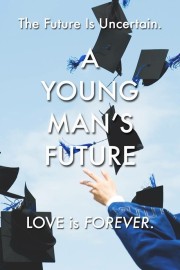A Young Man’s Future
Producer John Paul Rice and writer-director Edgar Michael Bravo have now given me four very different films to review over the years, and they never cease to surprise me. All four have been different from one another, but they share a common thread of respect for their characters and the emotional journeys that they go through. The best film of theirs I’ve seen was 2012’s “Mother’s Red Dress,” which was a psychological drama about a young man whose family life is much more complex than it already seems on the surface, and many of those same traits are in their newest feature together, “A Young Man’s Future.” This is more grounded in real-world observation, though, and that makes it compelling to watch. It feels like it comes from a very real place, and the emotions it lands are honest and true. (No surprise, as it is based on a true story.)
The film follows Jeremy (Jordan Becker), a young man studying linguistics in college who has a family who loves him and sees a bright future for him. His personal life isn’t so bright, however, as his boyfriend, Elliot (Jacob Fortner), constantly cheats on him, and while saying he cares for him, lets his actions say otherwise. Jeremy is through with it, and it isn’t long before he tells Elliot to move out. Almost immediately after, Jeremy meets Scott, a mechanical engineering student and amateur chef who immediately makes Jeremy’s life happier, a change that his parents back in New Hampshire can tell when first seeing them together. When Jeremy meets Scott’s father (Derek S. Orr), though, he is greeted with a certain degree of skepticism, and while at first we think it might be because he has issues with Scott being gay, some erratic behavior by Scott leads us to think otherwise. Turns out that Scott is schizophrenic, and when it gets really bad, it leaves Jeremy with an important choice to make about what his future holds. He loves Scott, so it’s initially an easy choice. Things are good for a bit until violence becomes a real risk. Both Jeremy’s parents and Scott’s dad encourage him to move on, but love sometimes make that choice a painful one.
When we first hear the voices in Scott’s head, I was wondering if I might be in store for a genre exercise akin to Bravo’s last film, “Mark’s Secret to Eternal Life” (which I reviewed when it was called “Monster Killer”), and while that would have been quite a different direction for the film from where it began, I’m actually quite glad it wasn’t the case, because that makes the ways Bravo has us experience Scott’s illness from his perspective more potent. Because the film is set in a palpable reality, because the characters are as well developed as they are, that makes the choices Jeremy is forced to come to grips with more engaging and more realistically complicated, especially when Elliot re-enters his life unexpectedly through some intervention by his mother. The last 20 minutes or so are an emotional stretch of film for Jeremy, and we are glad to see that he makes choices that honor both himself and the people who matter most to him. That wins him over with Scott’s father, allows Elliot and his parents to see him clearly, and makes the last moments we see him with Scott beautiful to watch, left hoping for the future ahead. The best filmmakers aren’t content with doing the same thing over and over, and we catch glimpses of them through their films. Rice and Bravo are men of compassion and fearlessness. I know this because they made a movie that celebrates those two qualities in its story, and main character.










